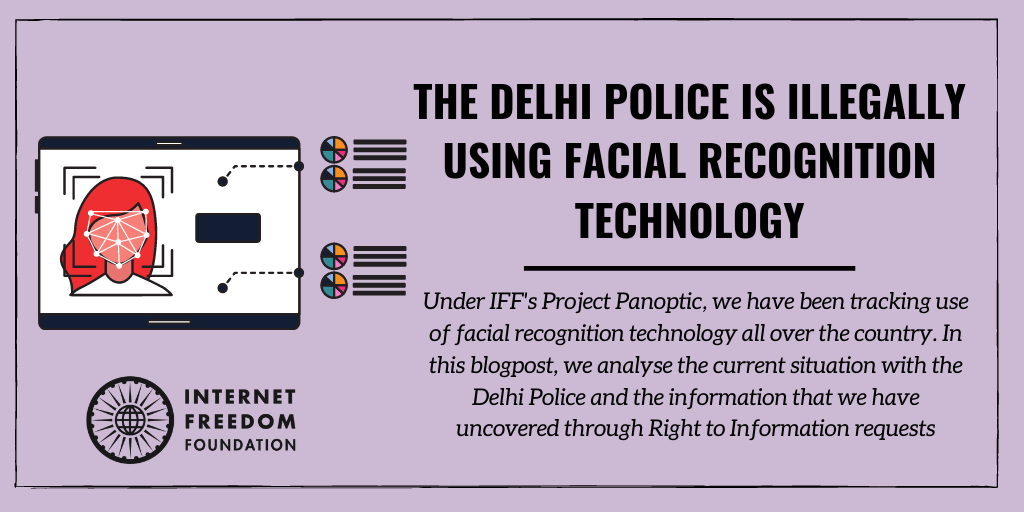
tl;dr
Since last year, reports have been emerging about the Delhi Police’s use of facial recognition technology. We have been constantly engaging with them through legal notices, representations and right to information requests to understand the full picture. In this blogpost, we collate and analyze our findings. Use of facial recognition without having a legal framework in place to regulate it raises the threat of state-sponsored mass surveillance.
The Delhi Police is using Facial Recognition
During the protests which took place last year, multiple reports emerged of the Delhi Police using facial recognition technology. On December 28, 2019, we sent a legal notice to the Delhi Police asking them to halt the use of facial recognition in Delhi. However, reports emerged that even in 2020 use of facial recognition by the Delhi Police is ongoing.
It is important to note here that use of facial recognition technology is being done in Delhi without there being any legal framework in place to regulate it. This is violative of the Hon’ble Supreme Court’s decision in Justice K.S. Puttaswamy vs Union of India. It states that any justifiable intrusion by the State into people’s right to privacy protected under Article 21 of the Constitution must conform to certain thresholds. These thresholds are:
- legality where the intrusion must take place a defined regime of law i.e. there must be an anchoring legislation, with a clear set of provisions;
- necessity which justifies that the restriction to people’s privacy is needed in a democratic society;
- proportionality where the Government must show among other things that the measure being undertaken has a rational nexus with the objective. The state must also demonstrate that there are no other alternatives both analog and digital which can fulfill said mandate; and
- procedural safeguards, where there is an appropriate independent institutional mechanism, with in-built procedural safeguards aligned with standards of procedure established by law which are just, fair and reasonable to prevent abuse.
What did we find out?
On January 24, 2020 we filed a Right to Information request with the Delhi Police asking them questions pertaining to their use of facial recognition and the legality of this use.
In their reply dated February 20, 2020, the Delhi Police stated that the legal framework based on which they have acquired facial recognition technology is the Delhi High Court’s decision in Sadhan Haldar v NCT of Delhi.
It is pertinent to note here that in Sadhan Haldar v NCT of Delhi, the Court has authorised the Delhi Police to obtain facial recognition technology for the purpose of tracking and re-uniting missing children. However, in their reply to our RTI request, in response to our query asking about the purpose for which the Delhi Police is using facial recognition, they replied that the technology is being used to match similar faces for police investigation.
This is a clear instance of function creep. Function creep occurs when a technology or system gradually widens its scope from its original purpose to encompass and fulfill wider functions. This is the major concern among many privacy experts with regard to the use of facial recognition technology wherein they are worried that its use will exceed past the indicated purpose of security and will end up facilitating state-sponsored mass surveillance.
This has already come to pass in Delhi with the Minister of Home Affairs Amit Shah saying in the Rajya Sabha that “ over 1,900 faces have been identified through facial recognition software for inciting violence in the national capital during the Delhi riots.” Use of facial recognition against individuals protesting against the actions of the government sets a chilling precedent and also threatens the fundamental rights as guaranteed by the Constitution to each citizen including the right to freedom of expression.
This is even more worrisome due to the fact that accuracy rates of facial recognition technology, as disclosed by the Delhi Police themselves in an affidavit in the High Court, are extremely low. In 2018, Delhi Police reported that the facial recognition system on trial was operating at an accuracy rate of 2 per cent. In 2019, when the accuracy rate fell to less than 1 per cent, the Ministry of Women and Child Development reported that the system couldn’t even accurately distinguish between boys and girls.
Project Panoptic
IFF has been tracking the development of the Delhi Police’s facial recognition system since last year. Additionally, under our Project Panoptic, we have also been tracking all other instances of facial recognition use in the country that we have come across. Our main aim behind this project is to increase transparency and accountability from the authorities who are implementing these projects.
One of the ways in which we demand transparency is through filing Right to Information requests. If you want to file a requests or need guidance with filing please reach out to us at [email protected]

